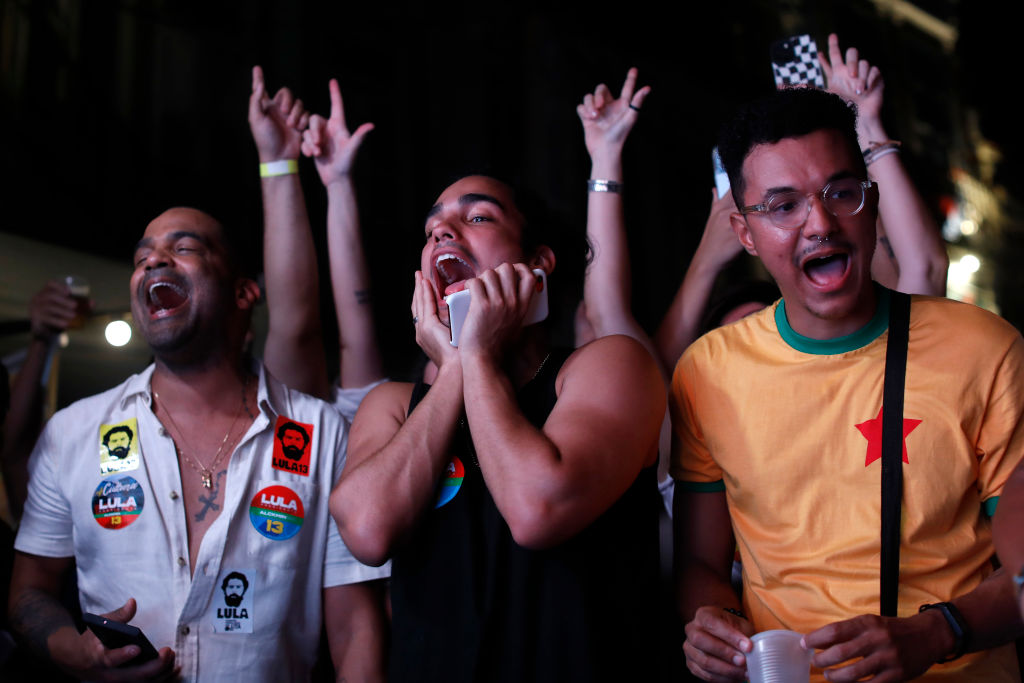Lula Narrowly Wins Brazil’s High-Stakes Election, Ending Bolsonaro’s Far-Right Presidency
Lula #Lula

Updated: October 31, 2022 12:41 AM EDT | Originally published: October 30, 2022 6:56 PM EDT
Brazilian voters narrowly decided against a second term for far-right President Jair Bolsonaro at national elections on Oct. 30, opting instead for the return of leftwing former President Luiz Inácio Lula da Silva, who took 50.9% of the vote against Bolsonaro’s 49.1%, according to the official tally.
The result is a stunning political comeback for Lula—as the 77-year-old president-elect is universally known. Lula left office in 2010 with an 83% approval rating, after overseeing an economic boom and a jump in living standards for poorer Brazilians. But in 2017, federal prosecutors implicated Lula in a vast corruption scheme and sent him to prison on charges of accepting a bribe. He, and Brazil’s left, have always denied the allegations, and, in 2021, Brazil’s Supreme Court overturned his conviction, ruling that his right to a fair trial had been compromised. That cleared him to run for president again this year.
“I experienced a resurrection in Brazilian politics,” Lula said on Twitter as he celebrated his victory. “They tried to bury me alive, and now I’m here to rule the country—in a very difficult situation, but I am sure that with the help of the people we will find a way out and restore peace.”
The race was Brazil’s closest-run in three decades. Voters faced a stark ideological choice between Lula, a progressive leftist, and Bolsonaro, a deeply conservative populist who promised to defend Christian values in Brazil. Bolsonaro becomes the first incumbent to lose a re-election bid in Brazil since the 1990s.
Read More: Lula Talks to TIME About Ukraine, Bolsonaro, and Brazil’s Fragile Democracy
Bolsonaro, a 67-year-old former army captain, has captured international attention over the last four years for his dismantling of protections for the Amazon rainforest, his fierce opposition to COVID-19 vaccines and social distancing, and a series of offensive statements about women and minorities. In Brazil, Bolsonaro’s presidency has been marked by a wide-ranging relaxation of gun laws, an expansion of police powers, a crusade against “gender ideology” and a series of scandals involving norm-breaking abuses of power.

Supporters of Luiz Inácio Lula da Silva of Workers’ Party cheer for their candidate during vote count in Largo Da Prainha area on presidential runoff day on Oct. 30, 2022 in Rio de Janeiro, Brazil.
Joao Laet—Getty Images
In a campaign centered heavily on nostalgia for his first presidency, Lula pledged to “rebuild” Brazil by restoring public services, addressing inequality, and bringing down energy prices and inflation. He has shared few details about how he plans to do that amid challenging economic conditions in Brazil and around the world.
Lula’s return to Brazil’s presidential palace may not run smoothly. President Bolsonaro has spent the past year warning of the risks of voter fraud in Brazil’s internationally-respected electronic voting system, without providing evidence. Many have heard clear echoes of former U.S. President Donald Trump’s behavior in the run-up to the 2020 election. He has repeatedly implied that he will not accept a result that shows him losing, proclaiming at a rally in 2021: “Only God can remove me from office.”
Bolsonaro, an avowed supporter of Brazil’s 20th century military dictatorship, has also tried to get Brazil’s military onside for a potential campaign to overturn the election. He has established deep ties between his government and the institution, appointing active generals to key ministries and Walter Souza Braga Netto, a reserve army general, as his 2022 running mate.
Analysts say military leaders are unlikely to lend their support to an actual coup attempt by Bolsonaro. But election day was marred by what many political commentators saw as a coordinated attempt at voter suppression. Residents of towns around the country—predominantly in Lula strongholds in the north and northeast of the country—shared footage on social media of Brazil’s federal highway police manning road blocks, while newspapers reported an unusually high number of traffic stops on buses, disrupting travel to polling stations. The highway police’s director general Silviney Vasquez has publicly endorsed Bolsonaro and the institution is seen as a bastion of support for the president. Alexandre de Moraes, the head of Brazil’s electoral court, ordered Vasquez to end the operations but claimed they had only delayed and not prevented voting.
Many fear Bolsonaro’s civilian supporters will in the coming days stage a Brazilian version of the Jan. 6 insurrection that took place in the U.S. last year. Social media watchdogs say that platforms like WhatsApp, Telegram and Facebook—all widely used in Brazil—have been awash with disinformation and conspiracy theories in the run-up to the vote, claiming that leftists planned to steal the election and would install a Communist dictatorship in Brazil if they succeeded.
Tensions are running high in Brazil. The two months before the first round were marked by a spike in political violence, with 121 politically-motivated attacks recorded, including 54 murders, according to a report by two human rights focused NGOs. Adding to fears of further violence is Bolsonaro’s flagship policy of cutting restrictions on firearms in Brazil, which has seen the number of guns in private hands double to nearly 2 million since 2018.
More Must-Read Stories From TIME